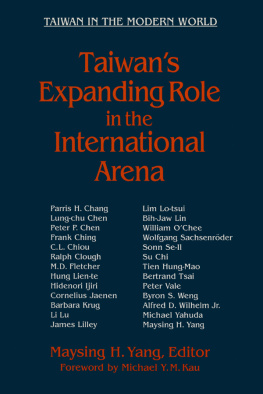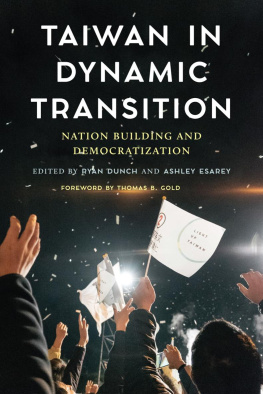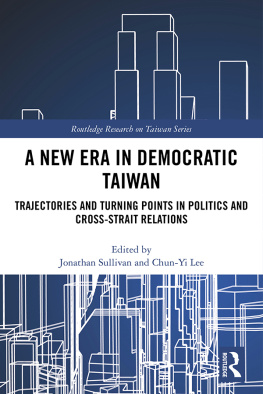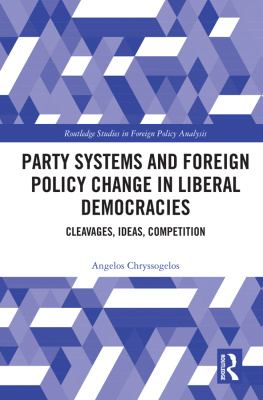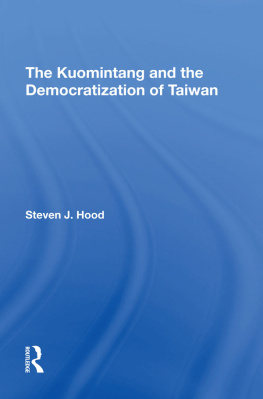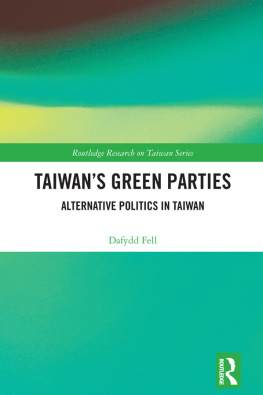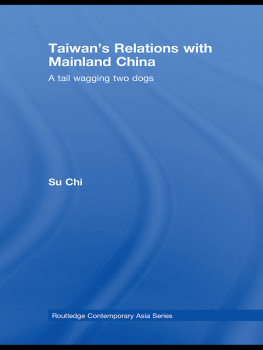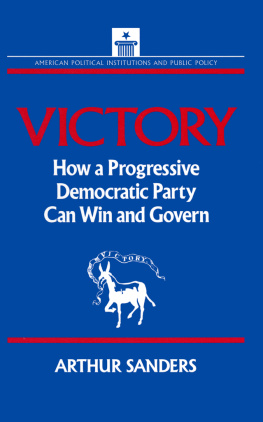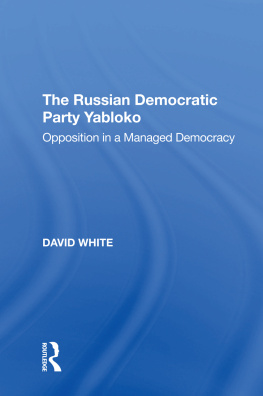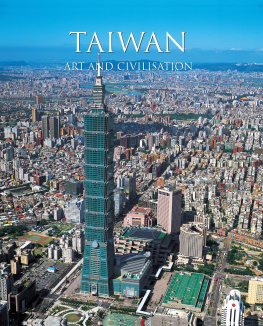Taiwans
Expanding Role
in the
International
Arena
An International Conference Volume Sponsored by
Department of Foreign Affairs
Democratic Progressive Party, Taiwan
TAIWAN IN THE MODERN WORLD
Taiwans
Expanding Role
in the
International
Arena
| Parris H. Chang | Lim Lo-tsui |
| Lung-chu Chen | Bih-Jaw Lin |
| Peter P. Chen | William OChee |
| Frank Ching | Wolfgang Sachsenrder |
| C.L. Chiou | Sonn Se-Il |
| Ralph Clough | Su Chi |
| M.D. Fletcher | Tien Hung-Mao |
| Hung Lien-te | Bertrand Tsai |
| Hidenori Ijiri | Peter Vale |
| Cornelius Jaenen | Byron S. Weng |
| Barbara Krug | Alfred D. Wilhelm Jr. |
| Li Lu | Michael Yahuda |
| James Lilley | Maysing H. Yang |
Maysing H. Yang, Editor
Foreword by Michael Y. M. Kau
First published 1997 by M.E. Sharpe
Published 2015 by Routledge
2 Park Square, Milton Park, Abingdon, Oxon OX14 4RN
711 Third Avenue, New York, NY 10017, USA
Routledge is an imprint of the Taylor & Francis Group, an informa business
Copyright 1997 Taylor & Francis. All rights reserved.
No part of this book may be reprinted or reproduced or utilised in any form or by any electronic, mechanical, or other means, now known or hereafter invented, including photocopying and recording, or in any information storage or retrieval system, without permission in writing from the publishers.
Notices
No responsibility is assumed by the publisher for any injury and/or damage to persons or property as a matter of products liability, negligence or otherwise, or from any use of operation of any methods, products, instructions or ideas contained in the material herein.
Practitioners and researchers must always rely on their own experience and knowledge in evaluating and using any information, methods, compounds, or experiments described herein. In using such information or methods they should be mindful of their own safety and the safety of others, including parties for whom they have a professional responsibility.
Product or corporate names may be trademarks or registered trademarks, and are used only for identification and explanation without intent to infringe.
Library of Congress Cataloging-in-Publication Data
Taiwans expanding role in the international arena / Maysing H. Yang, editor.
p. cm.
Papers presented at Taiwans Expanding Role in the International Arena, held at Taipei International Center, August 2021, 1993.
An East gate book.
Includes index.
ISBN 1-56324-968-5 (alk. paper).
ISBN 1-56324-992-8 (pbk: alk. paper)
1. TaiwanForeign relations1945 2. TaiwanInternational status. 3. TaiwanPolitics and government1988
I. Yang, Maysing H.
DS799.818.T37 1997
327.51249dc21 96-40275
CIP
ISBN 13: 9781563249921 (pbk)
ISBN 13: 9781563249686 (hbk)
Contents
Michael Ying-Mao Kau
Maysing H. Yang, Director, Democratic Progressive Party
Lung-chu chen, Professor, New York Law School, United States
Lim Lo-tsui, Member of the Legislative Yuan, Taiwan
Hidenori Ijiri, Professor, University of Tsukuba, Japan
M.D. Fletcher, Professor, University of Queensland, Australia
Comments by Peter P. Chen
Professor, Wayne State University, United States
Barbara Krug, Professor, University of Saarland, Germany
Sonn Se-Il, Member of the National Assembly, Democratic Party, Republic of Korea
Comments by Wolf gang Sachsenrder
Director, East and Southeast Asia Department, Friedrich Naumann Institute, Germany
Cornelius Jaenen, Professor, University of Ottawa, Canada
Comments by Hung Lien-te
Visiting Professor, National Taiwan University
Peter Vale, Professor, University of Western Cape, South Africa
Comments by Parris H. Chang
Member of the Legislative Yuan, Taiwan
Ralph Clough, Professor, Johns Hopkins University, United States
Comments by Su Chi
Deputy Director, Institute of International Relations, Taipei
Alfred D. Wilhelm Jr., Vice President, Atlantic Council, United States
Comments by Tien Hung-Mao
Director, Institute for National Policy Research, Taiwan
Michael Yahuda, Reader, London School of Economics and Political Science, United Kingdom
Comments by Byron S. Weng
Professor, Chinese University of Hong Kong
Li Lu, J.D. Candidate, Columbia University School of Law, United States
Comments by Bih-Jaw Lin
Director, Institute for International Relations, Taiwan
Chaired by Maysing H. Yang, Director, Department of Foreign Affairs, Democratic Progressive Party, Taiwan
Comments by:
Chaired by James Lilley, Former U.S. Ambassador to China
Comments by:
A serious discrepancy has developed in recent decades between Taiwans economic and political developments, on the one hand, and its international status and participation, on the other. Economically, Taiwan has achieved the respected status of Newly Industrializing Country (NIC). As an economic powerhouse, the island now ranks no. 13 in world trade and no. 20 in GNP. It has accumulated close to U.S.$100 billion in foreign currency reserves, second only to Japan, and is rated as the seventh largest outbound investment country in the world.
Politically, Taiwan has achieved a dramatic transformation, moving from a quasi-Leninist authoritarian system to a full-fledged competitive democracy. The harsh political repression and rigid power monopoly of the old Kuomintang (KMT) elite has been replaced by dynamic electoral politics and rigorous party competition. The old power holders, transplanted to Taiwan by Chiang Kai-shek from mainland China in the late 1940s, have now yielded their political power to the younger generation of indigenous leaders from Taiwan. With the lifting of the so-called three controls (control of martial law, the ban on forming new political parties, and the restriction on the freedom of the press) in the late 1980s, and the overhauling of parliamentary representation and the direct popular election of the president in the 1990s, Taiwan has now emerged with pride and rigor as a full-fledged democracy.
Yet, since 1971, following its expulsion from the United Nations, Taiwans international status and diplomatic recognition have declined dramatically. In the 1970s, under pressure from the Peoples Republic of China (PRC), Taiwan was forced out of twenty-nine major intergovernmental organizations (IGOs), and fifty-one countries dropped their diplomatic recognition of the Republic of China (ROC) on Taiwan. By 1979, Taiwan was able to keep formal membership in only 10 IGOs and maintain formal diplomatic ties with only twenty-one countries. Taiwan had practically become a pariah state in the world arena.
Traditionally, under the authoritarian regime of Chiang Kai-shek and his son Chiang Ching-kuo, Taiwans foreign policy and external relations were treated as an exclusive domain of the ruling elite and were kept out of the reach of political debate and popular scrutiny. The process of rapid economic development and political democratization since the mid-1980s, however, has ushered in a new era of close attention to and heated controversy over the issue of foreign policy.

